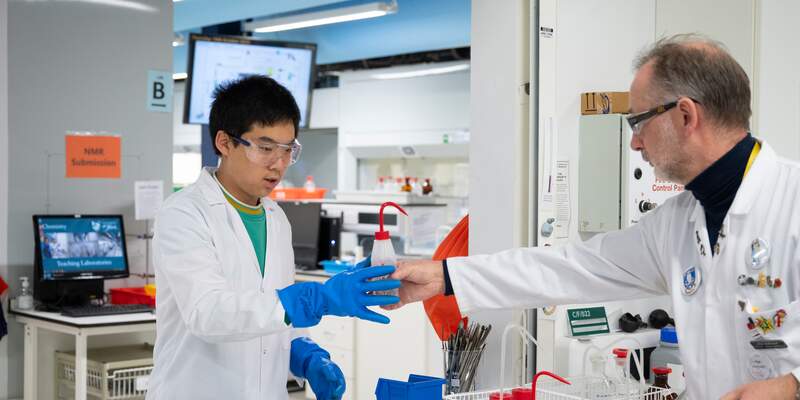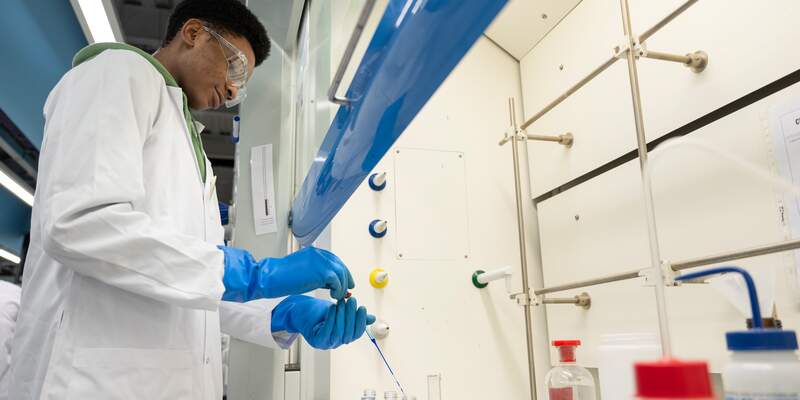
Undergraduate degrees in chemistry
Why study chemistry at York?
We're a friendly and supportive department with an outstanding reputation for teaching and research in chemistry. Our staff continually push the boundaries of knowledge. Their advanced research informs what you learn.
Our undergraduate courses span the breadth of chemical sciences, with the ability for you to choose to tailor your studies with our option modules if you have already developed an interest in a specific area. Our excellent study and teaching facilities will provide you with the experience and skills to help you excel in your chosen career.
Our courses
All of our courses are accredited by the Royal Society of Chemistry. Our teaching covers biological, inorganic, physical and organic chemistry, green and sustainable chemistry, atmospheric chemistry, and materials chemistry.
Chemistry, Biological and Medicinal Chemistry courses
Chemistry, Green Principles and Sustainable Processes courses
- Chemistry, Green Principles and Sustainable Processes (BSc)
- Chemistry, Green Principles and Sustainable Processes with a year abroad (MChem)
- Chemistry, Green Principles and Sustainable Processes with a year in industry (MChem)
- Chemistry, Green Principles and Sustainable Processes with a year in York (MChem)
Chemistry, the Atmosphere and the Environment courses
Course options
We offer three-year BSc courses and four-year MChem integrated Masters courses. Students who take the more in-depth MChem courses may be aiming for a scientific research career. Our MChem courses all include a final-year project, which may be completed in a research laboratory in York, or in a research laboratory in a partner institution in another country, or as part of an industrial placement.
Our student exchanges give you the opportunity to spend an academic year in a range of countries. The exact programme undertaken will vary according to which overseas university you attend, but all involve a research project.
If you're studying at a university outside the UK, you may be able to spend up to a year in York as a visiting student.
The Department of Chemistry also contributes to the following undergraduate courses:
Scholarships and funding
Find out about scholarships and studentships that are available to students in the Department of Chemistry.
Visit days
Our visit days are a great opportunity to get to know the department. Whether you're coming for a pre-offer or post-offer visit, we'll be there to answer your questions and show you around our facilities.

Meet our inspiring staff

Discover research lectures from academic staff across the Department.
Our facilities
We offer an impressive range of modern teaching labs and research equipment which provide a hands-on experience and help prepare you for your career. They're looked after by our talented and dedicated team of technicians.

Careers

Find your career advantage: Turn ambition into achievement with our expert guidance and connections. From your first day here to life after graduation, we’ll help you succeed.
Our degree courses are designed to give you a thorough grounding in all aspects of modern chemistry. Although the majority of our graduates progress to become scientists, the analytical and transferable skills which constitute part of our degrees are recognised as suitable training for a wide range of careers.
Student and graduate stories
Hear what our students and graduates have to say about studying with us.

Industrial placements are helpful in so many ways. Want to do a PhD? Great, you’ll gain crucial experience which is highly valued in academia. Already know what industry you want to go into? Even better, you’ll gain direct experience and may even get offered a job after your placement!

I chose York because of the friendly and caring atmosphere of the department, and the amazing labs. The lecturers are really passionate about what they teach and they’re always willing to help.
Free online courses
Get a taste of studying chemistry with our online course. You'll study topics including searching for new antibiotics, how to make the most delicious coffee and designing performance-enhancing sportswear.
Explore what higher education is all about. Get tips for making the most of your university life.
